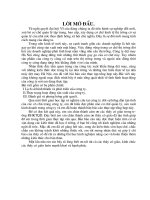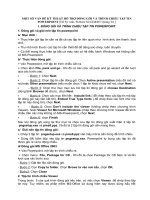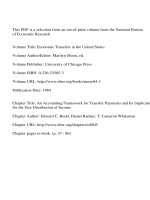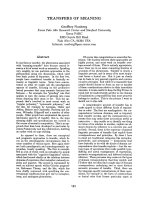ACH Transfers
Bạn đang xem bản rút gọn của tài liệu. Xem và tải ngay bản đầy đủ của tài liệu tại đây (154.91 KB, 49 trang )
Payment Systems
ACH Payments
Basic Concepts ACH Payments
Governing Law
• EFTA applies to natural persons with
consumer accounts.
• Common Law of Contracts
• NACHA Rules (Incorporating Article 4??)
Basic Concepts ACH Payments
The Players
Originator: The one who makes the entry that
initiates the transaction (not necessarily the
payor)
Originating Depositary Financial Institution (ODFI):
Financial Institution of the Originator
ACH Operator: Party that carries communication
and funds from ODFI to RDFI (usually a Federal
Reserve Bank)
Receiving Depositary Financial Institution (RDFI):
Financial Institution of the Receivor
Receiver: Party to which an entry is directed
Basic Concepts ACH Payments
Types of Entries
Credit Entry: Pay money
Debit Entry: Withdraw money
Note two ways to pay money:
Payor initiates a credit entry
Payee initiates a debit entry
Payments settled at Federal Reserve Accounts
of the participating banks
Basic Concepts ACH Payments
Timing
Debit Transaction must be entered the day
before the specified Settlement Date
Credit Transaction must be entered one or two
days before the specified settlement date
Return of Entries (Debit or Credit) must be
made by RDFI to its ACH Operator by the
second business day after the Settlement
Date
Basic Concepts ACH Payments
Timing
Stopping Debit Entries
Consumers can stop if they notify RDFI three
banking days before the settlement date
ODFI’s have five banking days to retract
duplicate or erroneous entries (but must act
in 24 hours of discovery)
Originators can retract if they notify Receiver by
the settlement date (No right to retract after
the settlement date for dissatisfaction with
underlying transaction)
Basic Concepts ACH Payments
Timing
Consumer Receivers of an erroneous or
fraudulant debit entry must notify RDFI within
15 days of a statement showing the entry.
RDFI must recredit “promptly” probably
meaning one day.
Basic Concepts ACH Payments
Risk of Loss for Unauthorized Items
ODFI warrants that the entry accords with
proper authorization.
Unauthorized Entry Timeline
1
2
3
33
O sends ODFI RDFI
RDFI
fraud
sends debits sends
entry
R
statement
account
47
R
notifies
RDFI of
error
RDFI
gets
funds
from
ODFI for
breach
of
warranty
ODFI
pursues
O for
funds
POS Conversion
Problem 8.9.1
• You pay ISP by an ACH transfer. You agreed
to this in account set up and provided bank
information.
• Is this most likely a credit entry or a debit
entry? See NACHA 14.1.28
Problem 8.9.1.a
• You pay ISP by an ACH transfer. You agreed
to this in account set up and provided bank
information.
• Is this most likely a credit entry or a debit
entry? See NACHA 14.1.28
• A Debit Entry Originated by ISP
Problem 8.9.1.a
• You pay ISP by an ACH transfer. You agreed
to this in account set up and provided bank
information.
• Is this most likely a credit entry or a debit
entry? See NACHA 14.1.28
• But it could be a recurring credit entry
initiated by you. Usually debit entries will be
for amounts that vary each month
Problem 8.9.1.b
• You live in Chicago (near Chicago Fed)
• ISP in Washington (near Seattle Fed)
• Identify parties and roles assuming a debit
entry
Problem 8.9.1.b
•
•
•
•
•
•
You
Your Bank
Chicago Fed
Seattle Fed
ISP Bank
ISP
Receiver
RDFI
Receiving ACH Operator
Originating ACH Operator
ODFI
Originator
Problem 8.9.1.c
• Assume next debit is due Monday April 1
• What (and by when) do you need to do to stop
the debit NACHA 8.4
Problem 8.9.1.c
• Assume next debit is due Monday April 1
• What (and by when) do you need to do to stop
the debit
• Oral or written notice to stop given to your bank
within three banking days of April 1. NACHA
8.4
Problem 8.9.1.c
• Banking Day means “any day” on which a DFI is
open for banking business during any part of
such date. NACHA 14.1.14
Problem 8.9.1.c
• Banking Day means “any day” on which a DFI is
open for banking business during any part of
such date. NACHA 14.1.14
• Unlike under Regulation CC Saturday can be
a banking day!
Problem 8.9.2
• You pay your credit card by ACH transfer (a
credit entry to your bank) from your home
computer
• You initiate a $7000 payment but change
your mind the next day. Can you retract?
Problem 8.9.2
• You pay your credit card by ACH transfer (a
credit entry to your bank) from your home
computer
• You initiate a $7000 payment but change your
mind the next day. Can you retract?
• There is nothing you can do!
– This is not a debit entry so no stop payment under
NACHA 8.4
– Originators can only reverse entries that are
erroneous (NACHA 2.5 and 8.1)
Problem 8.9.3
• Your bank pays a check not properly payable
• This causes your account not to have enough
to cover a scheduled debit which is thus
returned
• The intended payee car lender repossesses
car and this casues other damage
• Is your bank laible to you?
Problem 8.9.3
§4-402(a) gives customers a right to
consequential damages for wrongful dishonor
of an “item”
An ACH debit is not an “item”
But NACHA 14.1.28 says “item” shall include
an entry and Article 4 will apply
What does that mean?
Problem 8.9.3
NACHA 14.1.28 says “item” shall include an
entry and Article 4 will apply
What does that mean?
Unless contrary NACHA Rule Article 4 rules
apply. Probably, as a matter of private
contract banks agree to be liable for
wrongfully dishonored debits as if they were
items and Article 4 applied!









